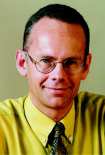Article
Who's who: Johann Dreyer
Going the distance has more than one meaning for Johann Dreyer, the executive chairman of Mosaic Software. A marathoner of some renown in his native South Africa, Dreyer has seen to it his company's products are used by clients in 31 countries.
November 29, 2001
Going the distance has never been a problem for Johann Dreyer.
Delivering long-distance technology solutions is a key part of the plan for the executive chairman ofMosaic Software, who also happens to be a former marathon runner of some renown in his native South Africa.
 |
Mosaic, an EFT software company established in South Africa, expanded its operations to serve clients in 31 countries in 2001. From telecommuting employees to long airplane rides, Mosaic finds ways to serve customers across several continents. It should be noted, however, that Dreyer's plan to go multi-national was there from the beginning.
"Obviously, when you move internationally, you have a lot of challenges with getting systems out," said Dreyer, who now lives in Florida. "Often you're working with different languages, smaller countries, etcetera. But part of what we have in our favor is a product designed from day one to be easily extendable and easily integratable into new territory."
Much of the flexibility comes from Mosaic's use of Internet technologies in its products. Dreyer noted that Mosaic was formed by a group of engineers and computer scientists, for whom utilizing current technologies has always been a priority.
"Some (companies) cannot use the Web to manage their systems, but that is what we designed into our product from day one," he said.
It didn't take long for Dreyer and his business partners to realize the Web was the way to go. As college students, Mosaic employees used the Internet all the time. When it started gaining commercial acceptance, they quickly jumped on the concept of Web-based electronic funds transfer.
Johann Dreyer:Executive chairman, Mosaic SoftwareBirthdate: Nov. 11, 1958 Birthplace: Capetown, South Africa Residence: Ft. Lauderdale, Fla.Education: B.Comm honors (degree that is midway between a bachelor's and a master's) in computer science, plus additional year, at Stellenbosch University in South Africa Resume: Founder of Software Collage, which later became Mosaic Software Family:Wife Rouxle, 11-year-old daughter Linda, 9-year-old son Mats Key quote: "Strive to treat people the way that you would like them to treat you." |
Fresh out of college, Dreyer did two years of military service, working in research. His first "real" job in the general sector, in the mid-1980s when EFT technology was in its infancy, was with a financial institution.
"At 23 years old and with no experience, I was thrown into the deep end," Dreyer said. "I spent two years traveling, meeting who I needed to meet and learning what I needed to know."
As a result of this experience, he formed Software Collage in 1992, which merged with a friend's company and became Mosaic in 1994. The friend, Willem van Biljon is Mosaic's CEO.
Today, Mosaic, a Microsoft Certified Solution Provider, has a reputation as a leader in Web-enabled ATM and prepay software solutions, enabling services like remote banking and payments, ATM processing, retail POS payments, EFT switching and mobile commerce. Clients include financial institutions, retailers, telecommunications operators, transaction processors, Internet service providers, card issuers and data processing service providers. As a vendor for 7-Eleven's Vcom project, Mosaic hopes to help change what the ATM can do - and what it will mean to deployers and end users in the future. Mosaic's Postilion software drives the nearly 100 Vcom kiosks, which allow users not only to withdraw cash but also to buy money orders, send and receive money transfers and cash checks, are now in convenience stores in Texas and Florida.
Future Vcom applications, according to 7-Eleven news releases, could include bill payment, deposit acceptance, event ticketing and offering Web-based services such as travel directions and road maps - maybe even online shopping.
"It's unique and it's the first of its kind worldwide," Dreyer said. "It's important because it might redefine how people view the ATM. It's very stimulating to be involved in a project that is redefining what the ATM is all about."
While Web-enabled technology is still in its early stages as far as gaining industry acceptance, Dreyer believes the adoption of such technology will be speedier than that of the ATM itself.
"Twenty-five years ago, the ATM was not a trusted device," he said. "Right now, the ATM is a very trusted piece of equipment. Hence, the take-on time that requires the trust of people would be much smaller. For example, check cashing has been a very popular function in locations where (the Vcom) has been deployed. It has already proven itself to be viable, and there was a good take-up rate on it."
The key problem with the adoption rate of such technologies, Dreyer said, is cost.
"It's not a cheap solution right now," he said. "But these new advanced functions are being driven by the retail sector. They are promoting it with the typical enthusiasm and advertising savvy of retailers, so that will help shorten the take-up time too." Dreyer's past success as a long-distance runner continues to serve him well today.
Russell Green, Mosaic's executive vice president of sales, said Mosaic employees participated in a benefit run last year, and Dreyer issued a challenge that if anyone in the company could break his record, he would keep them on the payroll for life -- and they wouldn't even have to come into the office. Of about 6,000 participants, Dreyer finished first in the CEO class, and sixth overall in that race.
"Needless to say," Green said, "we're all still here earning our income."
They're also helping change the way the world will conduct business in the not-so-distant future, and not just because Dreyer's long-distance stamina ensured their active employment status. His long-range outlook, beginning with his travels around the globe in search of EFT solutions, is behind it too.
Yet he insists he couldn't have experienced such success without support from his employees.
"I think it's a reflection of the enthusiasm and type of people we have, to create the ability to expand to 31 countries worldwide from effectively four locations," Dreyer said.
 ChatGPT
ChatGPT Grok
Grok Perplexity
Perplexity Claude
Claude












